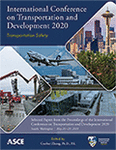International Conference on Transportation and Development 2020
A Comparative Study of Prediction Models on the Duration of Traffic Incidents
Publication: International Conference on Transportation and Development 2020
ABSTRACT
Traffic incident is a big challenge for traffic safety management. The duration of traffic incidents is critical to measure the severity of the incident and essential for improving traffic management abilities. We collected the traffic incident data of major urban roads in Tianjin, China, for consecutive 2 years. Our study conducts a comprehensive analysis of the main factors affecting the duration of the traffic incidents, such as the occurrence time, the road type, the vehicle type, and the number of injured. By using the classical statistical regression model and the several popular machine learning techniques, we try to predict the duration of the traffic incidents and compare the results generated by these models. The results show that the prediction errors of the model are distributed between 30% and 40%. The model established by the machine learning techniques has higher precision than simple linear regression models. Notably, support vector regression performs best among these models. Moreover, the tree-based can be applied for a fast estimation of the traffic incident duration, which deserves application in real-life scenarios.
Get full access to this article
View all available purchase options and get full access to this chapter.
REFERENCES
Basak, D., Pal, S.and Patranabis, D. C. (2007). Support vector regression. Neural Information Processing-Letters and Reviews 11, 203-224.
Da Silva, I. N., Spatti, D. H., Flauzino, R. A., Liboni, L. H. B.and Dos Reis Alves, S. F. (2017). Artificial neural networks. Cham: Springer International Publishing.
Hojati, A. T., Ferreira, L., Washington, S.and Charles, P. (2013). Hazard based models for freeway traffic incident duration. Accident Analysis & Prevention 52, 171-181.
Ke, A., Gao, Z., Yu, R., Wang, M.and Wang, X. (2017). A hybrid approach for urban expressway traffic incident duration prediction with Cox regression and random survival forests models (IEEE), pp. 113-118.
Kesavaraj, G.and Sukumaran, S. (2013). A study on classification techniques in data mining (IEEE), pp. 1-7.
Khattak, A. J., Liu, J., Wali, B., Li, X.and Ng, M. (2016). Modeling traffic incident duration using quantile regression. Transport Res Rec 2554, 139-148.
Kim, W.and Chang, G. (2012). Development of a hybrid prediction model for freeway incident duration: a case study in Maryland. International journal of intelligent transportation systems research 10, 22-33.
Kuang, L., Yan, H., Zhu, Y., Tu, S.and Fan, X. (2019). Predicting duration of traffic accidents based on cost-sensitive Bayesian network and weighted K-nearest neighbor. J Intell Transport S 23, 161-174.
Li, R., Pereira, F. C.and Ben-Akiva, M. E. (2015). Competing risks mixture model for traffic incident duration prediction. Accident Analysis & Prevention 75, 192-201.
Lin, L., Wang, Q.and Sadek, A. W. (2016). A combined M5P tree and hazard-based duration model for predicting urban freeway traffic accident durations. Accident Analysis & Prevention 91, 114-126.
Ozbay, K.and Kachroo, P. (1999). Incident management in intelligent transportation systems.
Park, H., Haghani, A.and Zhang, X. (2016). Interpretation of Bayesian neural networks for predicting the duration of detected incidents. J Intell Transport S 20, 385-400.
Smith, K.and Smith, B. L. (2002). Forecasting the clearance time of freeway accidents.
Song, Y.and Ying, L. U. (2015). Decision tree methods: applications for classification and prediction. Shanghai archives of psychiatry 27, 130.
Valenti, G., Lelli, M.and Cucina, D. (2010). A comparative study of models for the incident duration prediction. Eur Transp Res Rev 2, 103-111.
Wang, S., Li, R.and Guo, M. (2018). Application of nonparametric regression in predicting traffic incident duration. Transport-Vilnius 33, 22-31.
Wang, W., Chen, H.and Bell, M. C. (2005). Vehicle breakdown duration modelling. Journal of Transportation and Statistics 8, 75-84.
Wu, W., Chen, S.and Zheng, C. (2011). Traffic incident duration prediction based on support vector regression. In, pp. 2412-2421.
Wyner, A. J., Olson, M., Bleich, J.and Mease, D. (2017). Explaining the success of adaboost and random forests as interpolating classifiers. The Journal of Machine Learning Research 18, 1558-1590.
Information & Authors
Information
Published In
International Conference on Transportation and Development 2020
Pages: 327 - 337
Editor: Guohui Zhang, Ph.D., University of Hawaii
ISBN (Online): 978-0-7844-8314-5
Copyright
© 2020 American Society of Civil Engineers.
History
Published online: Aug 31, 2020
Authors
Metrics & Citations
Metrics
Citations
Download citation
If you have the appropriate software installed, you can download article citation data to the citation manager of your choice. Simply select your manager software from the list below and click Download.
